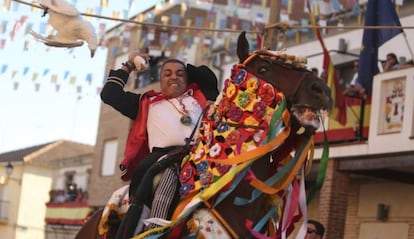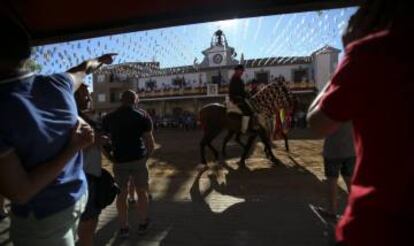The Toledo town where horse riders rip the heads off dead geese
The ¡°traditional¡± fiestas in El Carpio de Tajo used to involve live animals strung from a rope, and are the object of protests from animal rights groups

The sound of a woodwind instrument and a drum break the silence in the streets of El Carpio de Tajo on Tuesday afternoon. Two musicians, instruments in hand, lead a procession headed to the Plaza de Espa?a in this village in Toledo, where around 500 people are awaiting the arrival of the riders of the Brotherhood of Santiago. Among them is 53-year-old member of the military Jos¨¦ Antonio Segovia, who is about to draw the applause of the crowd.
The clapping will come after he fixes his stare on the neck of a goose that is hanging from a rope by its feet, and gallops the 20 meters toward it, before stretching out his arm and trying to wrench the animal¡¯s head from its body. Then he can expect cheers, kisses, and congratulations. In this municipality of 2,000 inhabitants, the yearly fiestas are underway.
The understanding was reached that it was unnecessary for the geese to suffer, and now they are killed? beforehand
¡°For us this is a tradition and we are proud of it,¡± explains Segovia about the so-called ¡°goose races,¡± a practice that draws the ire of animal-rights groups and is part of the annual festivities.
The geese whose heads are literally up for grabs are dead. But years back, they were strung up while still alive. ¡°The understanding was reached that it was unnecessary for them to suffer, and now they are killed beforehand,¡± explains the horseman. ¡°My father was a racer and I hope that my son and my daughter will be too.¡±
According to the local council, these fiestas, which celebrate the town¡¯s patron saint, Santiago, have taken place for more than 400 years. ¡°The first statutes of the Brotherhood of Santiago, from that era, mention them, although their origins could come from the Middle Ages,¡± explains the council about the celebrations.

The equestrian activities start with three ¡°races,¡± which take place at 10am, 1pm and 7pm. The riders barrel through the streets of the village in pairs, holding on to one another. ¡°They must display their equestrian skill by holding each other by the shoulder and trying to keep the horses as close together and traveling as fast as possible.¡±
Once the 7pm race is over, it¡¯s time for the main course: the decapitation of the geese. At 7.45pm, two groups of workers raise two large wooden posts, six meters apart, and join them with a thick rope. Then they tie the first animal to the cord and raise it up into the air, where it hangs among a row of small plastic flags representing Spain, Castilla-La Mancha and the European Union. There is a murmur of expectation among the crowd, and all eyes are on the first rider, who is headed to his target. On the first attempt, he rips off the head. The rider kisses his fingers and signals toward the sky. The village band starts to play the national anthem from the town hall balcony.

The fiestas in El Carpio de Tajo passed off on Tuesday without incident. In this village, located 40 kilometers from Toledo, locals ignore the repeated complaints filed by animal-rights groups, who have been campaigning against the goose races for years.
¡°It¡¯s an archaic and unnecessary activity,¡± says Silvia Barquero, the president of Spain¡¯s Animalist Party Against Mistreatment of Animals (PACMA). ¡°They kill animals with the sole aim of keeping them as trophies for the participants. No one could possibly conceive that someone could enjoy themselves like this in the 21st century,¡± she argues.
PACMA was also behind the campaign to end the Toro de la Vega fiestas, in which locals in the Valladolid town of Tordesillas pursue a bull on horseback, finally cornering it and killing it with lances. In 2016, the hunt went ahead, but the regional government banned killing the bull.
The horseriders barrel through the streets of the village in pairs, holding on to one another
¡°The sensitivities of people in this country is very different from the image that this absurd, violent and inexcusable tradition offers us,¡± adds Carmen C¨®rdoba, a woman from Alicante who is committed to stopping the fiestas in El Carpio and who has collected 135,000 signatures via the Change.org campaigning website in support of her campaign. The list of names was handed over in June to the Castilla-La Mancha regional government.
The mayor of the town, Germ¨¢n Jim¨¦nez, describes the controversy as ¡°false,¡± insisting that the races take place without incident and are supported by the majority of residents, who already came up against animal-rights groups three decades ago. That time, they lost.
It¡¯s an archaic and unnecessary activity
Silvia Barquero, president of Spain¡¯s Animalist Party Against Mistreatment of Animals (PACMA)
¡°The decapitation of live geese at the Santiago fiestas, which was banned by the Toledo Civil Government at the beginning of the 1970s, was reestablished,¡± explains a book about the history of El Carpio. ¡°But this custom was vilified by the public. On the request of the Society for the Protection of Animals, there was such a fuss that the Government banned it outright in 1983.¡±
At 8.57pm applause can be heard again in the Plaza de Espa?a. The spectacle is over and the riders, after having left 21 geese headless ¨C some after as many as 20 tries ¨C make their way to the house of the next hermano. He will be carrying the banner of the brotherhood at the fiestas in 2018. ¡°Many thanks,¡± he says, clearly emotional. ¡°I hope that next year we will enjoy ourselves at least as much as this year.¡±
English version by Simon Hunter.
Tu suscripci¨®n se est¨¢ usando en otro dispositivo
?Quieres a?adir otro usuario a tu suscripci¨®n?
Si contin¨²as leyendo en este dispositivo, no se podr¨¢ leer en el otro.
FlechaTu suscripci¨®n se est¨¢ usando en otro dispositivo y solo puedes acceder a EL PA?S desde un dispositivo a la vez.
Si quieres compartir tu cuenta, cambia tu suscripci¨®n a la modalidad Premium, as¨ª podr¨¢s a?adir otro usuario. Cada uno acceder¨¢ con su propia cuenta de email, lo que os permitir¨¢ personalizar vuestra experiencia en EL PA?S.
En el caso de no saber qui¨¦n est¨¢ usando tu cuenta, te recomendamos cambiar tu contrase?a aqu¨ª.
Si decides continuar compartiendo tu cuenta, este mensaje se mostrar¨¢ en tu dispositivo y en el de la otra persona que est¨¢ usando tu cuenta de forma indefinida, afectando a tu experiencia de lectura. Puedes consultar aqu¨ª los t¨¦rminos y condiciones de la suscripci¨®n digital.











































